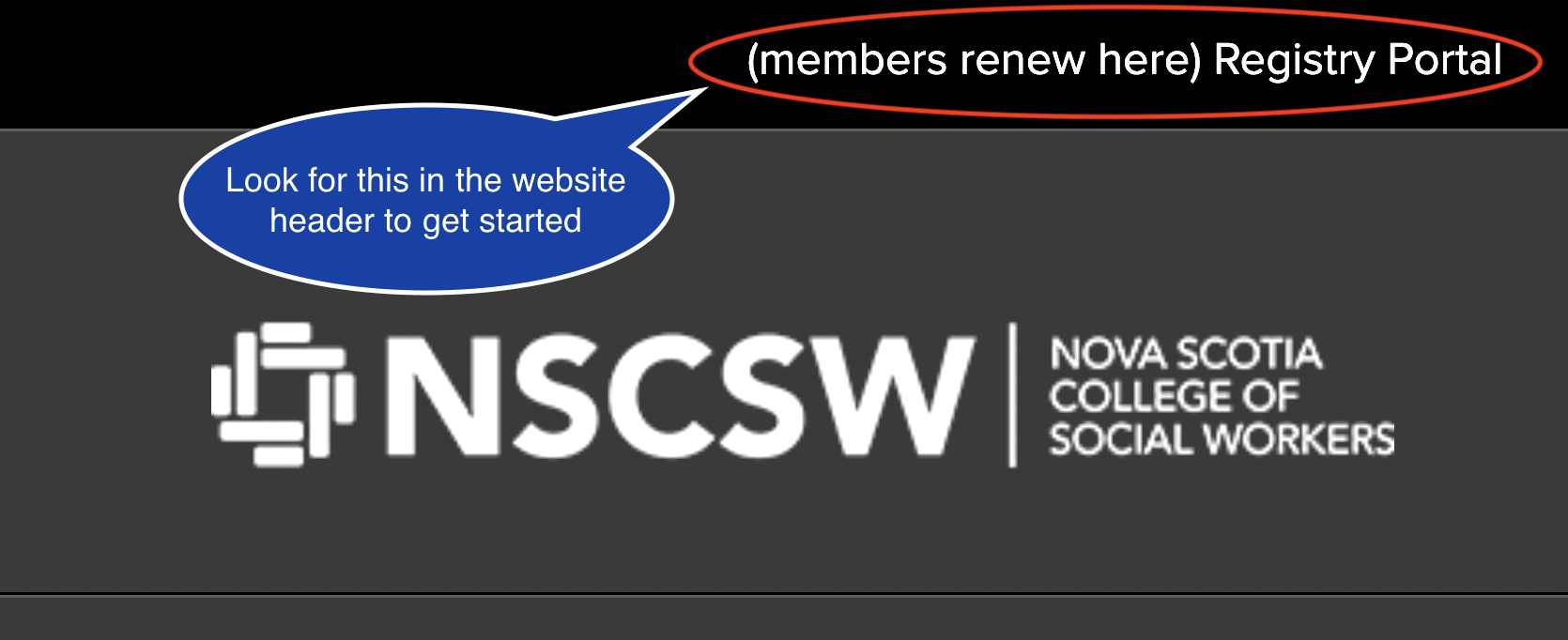
Members of NSCSW can now complete your 2026 registration renewal online.
Please note that we have a new Code of Ethics & Standards of Practice that will take effect on February 1, 2026. Your registration renewal process will include confirmation that you have reviewed the new Code and Standards and agree to practice in compliance with them. You can read them online, or watch a video presentation.
Shortcuts:
- Member login
- Professional development
- Renewal form
- Payment
- Completing renewal
- Leaving the College
- Why we renew
- Late renewals
- Early bird draw
This post explains the steps to completing the renewal process. Each step is followed by a short list of troubleshooting tips, answers to questions frequently asked by our members, and links to helpful resources.
- If you encounter a problem that cannot be fixed with the troubleshooting tips on this page, please contact the College for assistance. Our staff can assist you by phone, email, or video call.
- If you need to visit our office in person, please email us to make an appointment so we can confirm availability; some staff members are on telework rotation, and our office will be closed entirely for several days at the end of December.
- We aim to respond within two business days to all renewal inquiries. Please avoid leaving messages for multiple team members as it can further slow down our response. If the person you contacted can’t help you themselves, they will forward your question to the correct person on your behalf.
- RSW (Telepractice) members will need to provide proof of continued registration in good standing within your home jurisdiction, instead of providing professional development details. Please contact Wilhemina Welbeck at [email protected] if you need staff support with a telepractice renewal.
As we do every year, we strongly encourage you to consider early renewal as a gift to your future self.
1. Member login
Access your member account online.
Use one of the link buttons in this post, or visit NSCSW.org and click the registry portal link in the menu at the very top of this page, then select the option for current NSCSW members.
Enter your member registration number and password to sign into your member account.
Login tips & troubleshooting
Click or tap a question to open it and see related answers and tips.
You can find it by looking up your name in the public registry, then type the number in with no spaces or symbols. Or you can sign in using your primary email address.
Click “Forgot your password?” and follow the directions, and you’ll receive an email with instructions to regain access. All fields are case-sensitive.
- Use the password reset option early; your profile will be locked if you enter an incorrect password three times in a row. Locked profiles will need intervention from College staff to unlock them. You must type in your email address to request a password reset; entering your member registration number won’t work there.
- We’re not sure why, but Hotmail addresses sometimes block our password reset emails and renewal notifications. If this happens to you, please contact us for help resetting your password. And if you have another non-Hotmail address you check frequently, please consider adding that to your member account instead.
- Workplace email addresses have security protocols controlled by your employer. If your colleagues have marked any of our messages as junk/spam, our emails might get routed to a junk folder or quarantined, and this can include the password reset email. Consider switching your member profile to a personal email address, or check in with your IT department.
Digital security settings at your workplace might limit which websites you can visit, or affect your ability to stay signed in. Try using a personal device from home, or talk to your IT department.
Use a modern web browser like Google Chrome, Edge, or Mozilla Firefox, and make sure you are using the latest version.
(Internet Explorer has been discontinued by Microsoft and is no longer reliable. We are hearing reports from our members that Safari does not consistently work as expected, especially on small screens like tablets and phones.)
Please double check whether you’ve clicked on the member account section of the registry portal. (The applicant section of the registry portal is not for renewals; that section is only for people who are applying to join NSCSW for the first time and do not have a member number yet.)
2. Professional development inventory
Click on Professional Development in the menu, and select Activities.
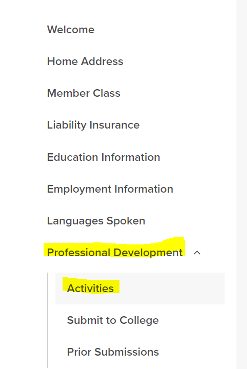
Scroll down and find Add Activity.
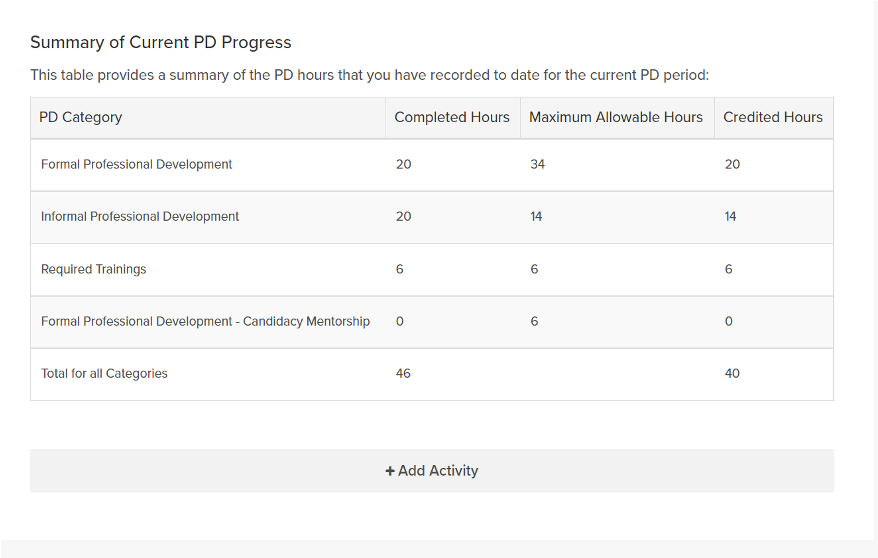
Use this option to enter each of your professional development activities from 2025.
Each activity should be entered separately, and should have both a category (e.g. Required Trainings) and selected subcategory/description (e.g. Ethics Training).
As you add each activity, please remember to write a brief reflection on how it will influence your future practice.
When you’re done, choose Submit to College from the menu.
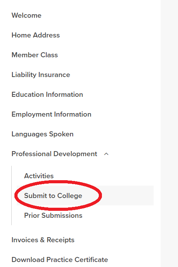
Once your minimum hours are met, the Submit button on this page should change its colour to blue – click this to continue. Click Finish when you are done. A renewal form link will then appear on the front page of your member profile.
Professional development tips & troubleshooting
Click or tap an item below to open it and see related answers and tips.
Please do not submit the professional development inventory until you have finished tracking your PD activities, and confirmed that you’ve completed the minimum annual requirements.
- You won’t be able to edit activities or add new ones after you submit the inventory. Please make sure all details are complete before you click that “submit” button.
- If you accidentally submit too soon and need to make changes, you will need to ask College staff to assist you before the renewal deadline of January 31.
- If you think your hours are complete and correct, but are unable to submit your inventory and proceed to the next step, please contact College staff for assistance.
- Our YouTube page has playlists of webinars related to each one of the five mandatory PD topics: tap here to check them out.
- Our PD activities page is also full of suggestions and helpful links.
All registered members must complete at least six hours of PD across five specific topics mandated by the College. You can learn more about each one on the PD guidelines page, but here’s a quick summary:
- social work ethics (1 hour training)
- ethical behaviour is fundamental to social work practice and guides our actions daily
- must be formal/structured training, not an informal activity
- must specifically be relevant to social work practice
- anti-racist & anti-discriminatory practice (1 hour training)
- intended to support comprehensive anti-oppressive practice and ensure that all social workers provide culturally safe, competent, responsive, and appropriate services to diverse communities
- approved topics include 2SLGBTQIA+, anti-racist practice, ableism, antisemitism, islamophobia, trauma-informed practice, training regarding inter-generational trauma, and other related content
- please try to choose a different area than you did last year
- must be formal/structured training, not an informal activity
- truth & reconciliation (1 hour training or activity)
- the social work profession must acknowledge and address its complicity in colonial undertakings that have harmed Indigenous communities
- requirement is designed to support recommendations of the Truth & Reconciliation Commission for necessary education for all people working in public service, with the aim of fostering resilience, reconciliation, healing, and understanding
- vicarious trauma & secondary stress (2 hours training or activity)
- intended to ensure that all social workers receive support in preventing or managing vicarious trauma and secondary stress from their work
- increasing and maintaining resilience in professional context is essential for protection of the public; social workers in state of burnout may become unable to practice safely
- examples: education regarding compassion fatigue/satisfaction, burnout or vicarious trauma; attending personal therapy; engagement in the NSCSW Peer Accountability Process; Indigenous healing rituals; group practices such as sharing circles; etc.
- note: most self-care activities are not eligible for this category, so those should be tracked under informal subcategory instead
- social justice (1 hour training or activity)
- learn more about how to practice advocacy, or voluntarily participate in advocacy beyond your job responsibilities
- social workers are called upon by our Code of Ethics to promote social fairness, equitable distribution of resources, and reduce barriers for marginalized, disadvantaged, and vulnerable individuals; activities in this category can be related to fair and equitable access to public services, equal treatment under the law, elimination of discrimination, poverty, and more
SWCs are required to complete and report to the College the same amount of PD as RSWs.
Please note that annual PD and the Candidacy Mentorship Program (CMP) are separate regulatory requirements, and are tracked in different sections of the member portal. The PD activities you complete to fulfil your membership renewal obligations should not be counted as CMP activities, and vice versa. However, SWCs are strongly encouraged to discuss PD planning with their mentors early in the registration year.
If you had active registration for the entire year, you need 40 hours of PD in 2025; of these, at least 20 hours must be formal learning, and at least 6 hours must be allocated to the mandatory topics.
You may need fewer hours if you were an associate for any part of the year. For a member who is with us all year:
- for 1-3 months associate you need 35 hours total PD (15 formal, 6 mandated topics)
- for 4-6 months associate you need 30 hours total PD (10 formal, 6 mandated topics)
- for 7-9 months associate you need 25 hours total PD (5 formal, 6 mandated topics)
- for 10-12 months associate you need 20 hours total PD (6 mandated topics)
You may need fewer hours if you joined the College after the first quarter of the year. For first-time registrants only:
- Jan-Mar start: need all 40 PD hours (20 formal, 6 mandated topics)
- Apr-Jun start: need 30 PD hours (15 formal, 6 mandated topics)
- Jul-Sep start: need 20 PD hours (10 formal, 6 mandated topics)
- Oct-Dec start: need 10 PD hours (4 formal, 6 mandated topics)
Our database only records one date for each activity, not a range. For example:
- after attending a multi-day conference or seminar, you may select the start date, and add clarifying details in the description section
- to track an ongoing volunteer commitment you may choose to enter each day as a separate activity
Compare it to the criteria in the professional development guidelines. If an activity is eligible for multiple categories, you can choose whether to assign all the hours to a single category or divide them up.
For example, a two hour workshop about ethics in social work research could be divided into one hour for the mandated social work ethics requirement, and the remaining hour assigned to formal learning.
Great! The requirement is a minimum standard for what must be completed within each registration year; we love to see our members choose to exceed it.
Please note that excess hours can’t be banked and carried from one year to the next. You will start with a fresh slate in February 2026.
3. Complete renewal form
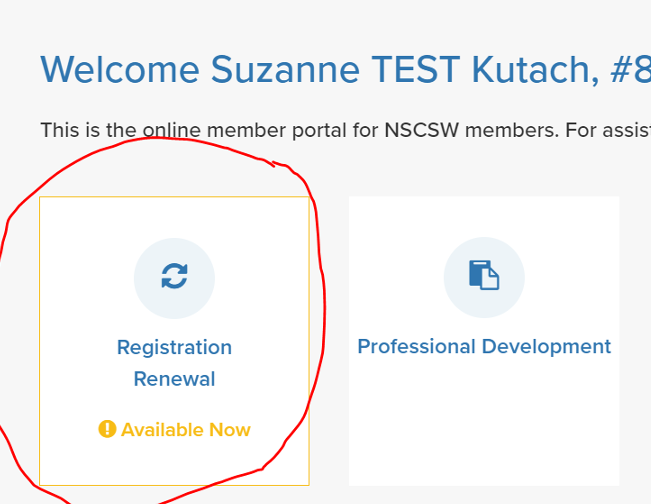
Complete the entire renewal form. Review all your information and confirm it’s correct.
- Have you recently changed your name?
- Do you have a new mailing address, primary email, or phone number?
- Is all your employment information up to date, and complete?
- Are you interested in volunteering for a position on Council, or a College committee?
- Are you subscribed to our mailing list to receive updates from the College, the biweekly email newsletter, and Connection magazine?
- Have you read the new Code & Standards yet?
Please make all your updates and changes before you submit the form.
Renewal form tips & troubleshooting
Click or tap an item below to open it and see related answers and tips.
All members must attest that they have sufficient liability coverage, which may be obtained via an employer and/or independently. Further documentation is only required for members who are solely liable for their practice (i.e. private practitioners).
Names you are commonly known by should be included in our registry so that someone searching for you will be able to find and confirm your registration
Let us know if you’re registered as a social worker in any other jurisdictions, and/or with a regulator for another health profession.
Please enter your private practice information in the employment section.
4. Select payment & submit renewal form
There are three payment options:
- To pay online, click the Pay Now box next to your registration fee(s), enter your credit card information, and click Process Payment.
- To pay by mail, select Cheque. Your cheque payment must be received before January 15.
- If your employer plans to submit payment directly on your behalf, select To Be Submitted By Employer. You will be able to view and print an invoice for them if it’s required for their internal procedures.
- Employer payments to NSCSW are made by cheque, so please complete your renewal form by January 15 to prevent processing delays.
If your employer is reimbursing you for registration fees, you may choose whether you prefer online or cheque payment. After your renewal is complete you can print copies of your receipt directly from your member profile, and submit them to your employer according to their internal process.
Payment is due no later than January 31 (see Late Renewal section below).
Payment tips & troubleshooting
Click or tap an item below to open it and see related answers and tips.
We will only accept payments once the online renewal form is complete. We strongly encourage you to pay online if you can.
If you accidentally submit an incomplete professional development inventory and proceed through the rest of your renewal and payment, your renewal may not be valid. Please reach out to our staff ASAP if you think you skipped a step.
We recommend putting your member number in the memo field of your cheque, in case another social worker in the registry has a similar name.
Cheque payments are only accepted until January 15, 2026, to allow time to process them before the end of the registration year (i.e. manually match cheques to member accounts and deposit payments). Cheques can be mailed, or dropped off at our office in Halifax (please use our mail slot if the office is closed), as long as they are delivered before the cutoff date.
Please note that we cannot offer payment extensions for postal delays caused by Canada Post strike action.
If a member’s cheque payment fails in late January, they may not have time to complete an alternate method of payment before the deadline. This could result in having their registration suspended in February.
Please ask them about their internal procedures and deadlines. And consider reminding them that Canada Post may not be the best way to send the cheque.
- You must complete the renewal form before we can accept their payment, so they may require you to provide them with a copy of your invoice. They may need time to collect and process these for multiple staff members at your organization, so act early.
- You should complete the renewal form by January 15 to prevent processing delays. Employers pay fees to us via cheque, but the funds are not attached to your member account until every other step of renewal is complete. Our staff spend the last two weeks of the year renewing and processing hundreds of these payments, and we don’t want yours to be held up.
- Employers usually don’t pay the additional fee for clinical specialization (see below).
Most employers do not cover the $50 annual fee to maintain your clinical specialization, since it is only required for private practice at this time.
- To pay this portion yourself when you’re completing the renewal form, use the Pay Now checkboxes to split your payment; select the box next to Clinical Specialist Fee and deselect the one next to Annual Renewal Fee.
- If you missed this step while completing the form, you can select Invoices & Receipts in the member profile menu to find your open invoice, and the option to pay online.
- If you are paying the full renewal fee yourself, you can pay online at any time before the renewal deadline, or by cheque before January 15.
- If your employer is paying the base fee:
- you can wait until the employer payment is processed by NSCSW staff, and then pay the remaining $50 online;
- you can send the College a cheque (as long as it is received before January 15); or
- you can email the College and ask for a phone or video call appointment for NSCSW staff to take your card information and manually enter your payment.
5. Completing renewal
Your registration is renewed for 2026 once the College receives both your complete online renewal form and your payment of registration fees. You need to renew your registration to continue practicing social work in the new year.
Once your registration is renewed, you can print your receipt and proof of 2026 registration (i.e. certificate or wallet card) directly from your online member account.
Leaving the College
If you will not be renewing this year, please contact Wilhemina Welbeck at [email protected] as soon as possible.
If you have retired or left the province, we will only need your statement to process your resignation. However, if you have changed positions and believe you are no longer practicing within the Scope of Practice as defined by the Social Workers Act, you must apply for resignation by submitting a request and current job description to the College for review, in accordance with Social Worker Regulation 26 (a).
Why is registration renewed annually?
The annual renewal process is a core NSCSW regulatory function. It confirms to the public that our members have the ethical foundation, skills and good character to practice social work in Nova Scotia.
Renewal is also an opportunity to reflect on your professional growth and development, and to bring to life the core social work value of integrity in professional practice. You’re recommitting to the values and standards of our profession and reflecting on your goals and commitment to lifelong learning.
Professional social work registration is a privilege our members can take pride in.
Late renewals
If a member’s registration is not renewed by January 31, it will be suspended on February 1; the member’s status in the online registry will change to “refused registration,” their rights and privileges for social work practice in Nova Scotia will be revoked, and they will need to pay an additional fee to reinstate their registration.
The Social Workers Act requires that individuals who practice social work in this province must be registered with our College. If a member’s registration is suspended, this may affect their employment.
It is each individual member’s responsibility to ensure their own registration is renewed on time. We encourage all members to consider completing their renewal as early as possible.
Early bird renewal draws
If you complete all steps for your annual registration renewal (including payment) on or before November 30, we will enter your name into a draw for a prize package. The name of the winner will be published in our member-only biweekly newsletter in December.
(College staff and Council are not eligible for these draws.)





